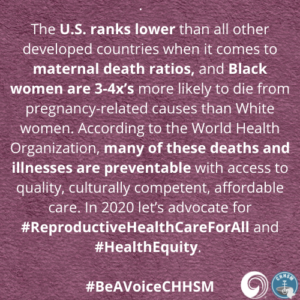New Advocacy Toolkit Installment Features Comprehensive Reproductive Health

Paid Family Leave is one of the many issues highlighted in the new installment of the Advocacy Toolkit.
The role of the church in advocating for reproductive health care is the focus of the April installment of the Be A Voice Advocacy Health and Human Services Toolkit. A joint project of the UCC’s Council for Health and Human Service Ministries and its Justice and Witness Ministries office in Washington, D.C., the toolkit offers historical and current context, helpful questions to ask candidates running for office, and a variety of social media graphics and web resources links.
“Often, when we think of reproductive health care, our minds drift to conversations of abortion and birth control — while both are prominent topics in the reproductive health care conversation, there are many more aspects to consider,” says Essence Ellis, CHHSM’s Rev. Jerry Paul Scholar. Those topics include health care services, health facilities, research, and expanded access to preventative care and culturally competent services, among others.
The toolkit also discusses reproductive rights — which includes affordable healthcare, adequate prenatal and pregnancy care, and sex education that is comprehensive and LGBTQ-inclusive — and reproductive justice. Reproductive justice uses a human rights framework to examine reproductive health care and the need for financial, geographic and cultural accessibility to care.
Ellis, a student at Yale Divinity School, works with the Stetson Library in New Haven, Conn., on bringing sexual health programming to local women and children. During an initial presentation in 2019, Ellis highlighted the importance of improving access to reproductive health care in communities of color. Afterwards, many attendees expressed interest in future conversations on sexual wellness. “For me, it was deeply inspiring to know that this topic holds importance for other Black women and that in the moment, the women in that space felt safe talking to me about it.”
The new programming is based on the comprehensive sexuality education curricula Our Whole Lives, developed by the UCC and the Unitarian Universalist Association.
 For Stephanie Franklin, senior vice president of UCAN in Chicago and a CHHSM board member, access to reproductive health and education is necessary in her work with youth. “Helping young people get access to and be safely informed about their reproductive health options is a primary focus of the Teen Parenting Service Network at UCAN,” she says. “We partner with community providers who are youth-positive and respect their right to choose what’s best for themselves without stigma, judgement or shame.”
For Stephanie Franklin, senior vice president of UCAN in Chicago and a CHHSM board member, access to reproductive health and education is necessary in her work with youth. “Helping young people get access to and be safely informed about their reproductive health options is a primary focus of the Teen Parenting Service Network at UCAN,” she says. “We partner with community providers who are youth-positive and respect their right to choose what’s best for themselves without stigma, judgement or shame.”
The CHHSM Board chose reproductive health as one of CHHSM’s advocacy emphases at its meeting last fall because of the crucial impact of reproductive health on the larger society. According to the World Health Organization, the United States is one of only 13 countries worldwide with a rising maternal mortality rate. Additionally, Black women are three-to-four times more likely to die from pregnancy-related causes than white women, and many of those deaths are preventable with access to affordable and culturally-competent care, and sexuality education that is medically accurate.
“At CHHSM, we believe these are important discussions that need to continue about women’s reproductive health and how our ministries can play a role in supporting that,” says Abby Drane, CHHSM board chair and president and CEO of Seven Counties Services/Bellewood & Brooklawn in Louisville, Ky. “Information and counseling are critical elements to this so that communities are fully-equipped with resources around full reproductive health.”
Join Our Mailing LIst
Follow on Facebook
Iredell Adult Day Services Hosts Ribbon-Cutting to Celebrate Adult Day Health Certification - CHHSM
www.chhsm.org
Iredell Adult Day Services (IADS) in Newton, N.C. — a nonprofit organization dedicated to caring for older adults, vulnerable groups, and their families, and part of EveryAge — hosted a ribbon cut...